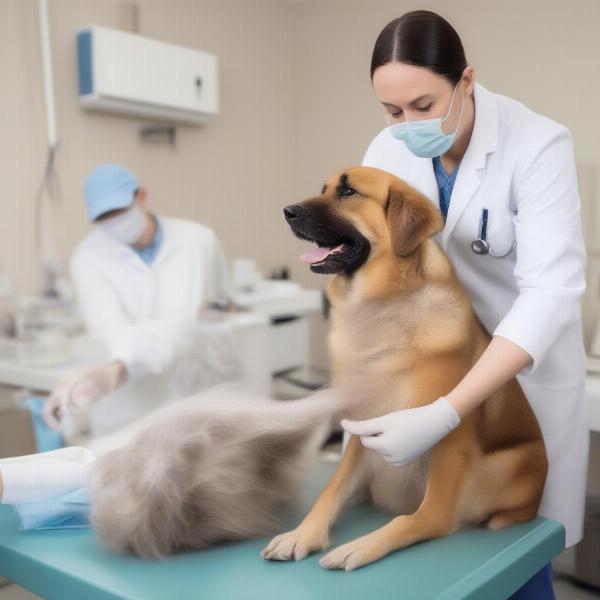Taking care of your dog’s skin is crucial for their overall health and well-being. Healthy skin is a barrier against infection, parasites, and environmental irritants. This guide will explore various aspects of dog skin care, from common problems to effective solutions, helping you keep your furry friend’s coat gleaming and their skin healthy.
Understanding Your Dog’s Skin
Just like humans, dogs can experience a variety of skin issues. These can range from dryness and itchiness to more serious conditions like allergies and infections. Understanding the underlying causes of these problems is the first step towards effective dog skin care. Factors like breed, diet, environment, and even genetics can play a role. A balanced diet, rich in essential fatty acids, can significantly contribute to healthy skin and a shiny coat.
Common Dog Skin Problems
Some of the most common skin problems in dogs include allergies (both environmental and food-related), parasites (fleas, ticks, mites), bacterial and fungal infections, and dry skin. Allergies can manifest as itching, redness, and hot spots. Parasites can cause intense itching and hair loss. Infections can lead to sores, scabs, and unpleasant odors. Dry skin, often exacerbated by dry climates or certain shampoos, can cause flakiness and discomfort.
Effective Dog Skin Care Practices
Regular grooming is essential for maintaining healthy dog skin. Brushing helps remove loose hair and dirt, distributes natural oils, and stimulates circulation. Bathing, when necessary, should be done with a gentle, pH-balanced dermcare dog shampoo specifically formulated for dogs. Over-bathing can strip the skin of its natural oils, leading to dryness and irritation.
Diet and Supplements for Healthy Skin
A nutritious diet is fundamental to good skin health. Ensure your dog’s food contains high-quality protein, healthy fats, and essential vitamins and minerals. Omega-3 and omega-6 fatty acids are particularly important for maintaining skin and coat health. In some cases, your veterinarian may recommend supplements like fish oil or hibiscus scrub for dogs to address specific skin issues.
When to Seek Veterinary Care
While many skin issues can be managed at home, some require professional veterinary attention. If your dog’s skin problem is severe, persistent, or accompanied by other symptoms like lethargy or loss of appetite, it’s crucial to consult a veterinarian. They can diagnose the underlying cause and recommend the appropriate treatment, which may include medication, special shampoos, or dietary changes.
 Veterinarian examining a dog's skin
Veterinarian examining a dog's skin
Maintaining a Healthy Environment for Your Dog’s Skin
A clean and comfortable environment can also contribute to healthy skin. Regularly wash your dog’s bedding and keep their living area free of allergens and irritants. Provide access to fresh water and ensure they have a comfortable place to rest.
Conclusion
Dog skin care is a multifaceted process that involves regular grooming, a balanced diet, and a healthy environment. By understanding the common skin problems and implementing effective care practices, you can help your dog maintain healthy, vibrant skin and a beautiful coat. Remember, early intervention is key, so don’t hesitate to seek veterinary care if you notice any persistent skin issues.
FAQ
- How often should I bathe my dog? Generally, bathing once a month is sufficient, but this can vary depending on breed, lifestyle, and specific skin conditions.
- What are the signs of dog skin allergies? Common signs include excessive itching, redness, hair loss, and hot spots.
- Can I use human shampoo on my dog? No, human shampoos are formulated for a different pH balance and can disrupt a dog’s skin, leading to dryness and irritation.
- What should I feed my dog for healthy skin? A high-quality diet rich in protein, healthy fats, and essential vitamins and minerals is crucial.
- How can I prevent dry skin in my dog? Avoid over-bathing, use a moisturizing dog shampoo, and consider adding omega-3 fatty acid supplements to their diet.
- When should I take my dog to the vet for skin problems? If the problem is severe, persistent, or accompanied by other symptoms, consult a veterinarian immediately.
- How can I keep my dog’s environment clean for their skin health? Regularly wash their bedding, vacuum their living area, and minimize exposure to allergens and irritants.
Related Articles on ILM Dog
About ILM Dog
ILM Dog is your trusted international resource for all things dog-related. We offer expert advice on breed selection, health and medical care, training and behavior, nutrition, grooming, exercise, puppy care, senior dog care, travel, products, and accessories. Whether you’re a new dog owner or a seasoned expert, ILM Dog provides reliable, practical information to help you provide the best possible care for your canine companion. For more information, please contact us at [email protected] or +44 20-3965-8624.